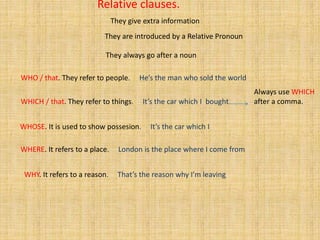Relative clauses
- 1. Relative clauses. WHO / that. They refer to people. He’s the man who sold the world WHICH / that. They refer to things. It’s the car which I bought WHOSE. It is used to show possesion. It’s the car which I WHERE. It refers to a place. London is the place where I come from WHY. It refers to a reason. That’s the reason why I’m leaving They always go after a noun They are introduced by a Relative Pronoun They give extra information Always use WHICH after a comma.
- 2. When can you leave the pronoun out ? • That’s the bus which goes to the station Subject If the pronoun is the subject, we cannot omit it • The bus which I caught didnt go to the station Object Subject If the pronoun is the object we can omit it • The bus I caught didnt go to the station • The man I met wasn’t the

